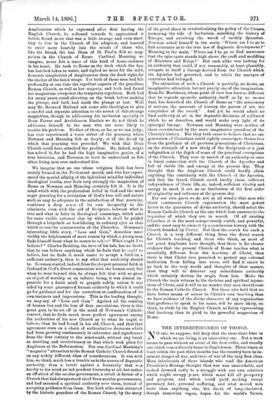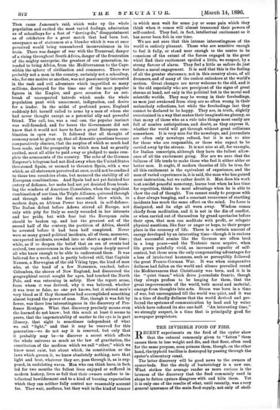THE INTERESTINGNESS OF THINGS.
NO one, we suppose, will deny that the immediate time in which we are living is an interesting one. Not a week seems to pass without an event of the first order, and usually one which comes directly home to Englishmen. Three times at least within the past three months has the country been in im- minent danger of war, and twice of war of the very first class. Most inhabitants of these islands who read the American President's Message thought that war was unavoidable, and looked forward sadly to a struggle with our own relatives which might occupy p are, which must kill all prosperity and progress, and which could yield nothing except pecuniary loss, personal suffering, and what moved men more than anything else, the death of long-cherished, though somewhat vague, hopes for the world's future.
Then came Jameson's raid, which woke up the whole population and excited the most varied feelings, admiration as of schoolboys for a feat of "derring-do," disappointment as of cricketers for a great match that had been lost, annoyance as of statesmen at a blunder which it was at once perceived would bring unnumbered inconveniences in its train. There was danger of war with the Transvaal, danger of a rising throughout South Africa, danger of the frustration of the mighty enterprise, the greatest of our generation, in- tended to bring Africa, from the Mediterranean to the Cape. within the sphere of civilisation and commerce. There was probably not a man in the country, certainly not a schoolboy, who, for one motive or another, was not passionately interested in the rash and evil adventure which imperilled so many millions, destroyed for the time one of the most popular figures in the Empire, and gave occasion for an out- break of unsuspected hatreds which made the whole population pant with amazement, indignation, and desire for a leader. In the midst of profound peace, England suddenly felt herself called to arms by a man of whom she had never thought except as a potential ally and powerful friend. The call, too, was a real one, the popular instinct was well-founded, and for hours the Government did not know that it would not have to face a great European com- bination in open war. It followed that all thought of economy must be given up, that all domestic questions became comparatively obscure, that the surplus of which so much had been made, and the prosperity in which men had so greatly exulted, muat all alike be paid away or pledged to make com- plete the armaments of the country. The echo of the German Emperor's telegram had not died away when the United States threatened Spain, or seemed to threaten Spain, with a war which, as all statesmen perceived at once, could not be confined to those two countries alone, but menaced the stability of all European combinations. And Spain had not yet finished her outcry of defiance, her mobs had not yet desisted from break- ing the windows of American Consulates, when the mightiest combination of our time, the Triple Alliance, quivered through and through under the first successful blow which, in modern days, an African Power has struck in self-defence. The Italian defeat before Adowa stirred all Europe, not only with pity for Italy so sorely wounded in her interests and her pride, but with fear lest the European calm should be broken up, and lest the greatest act of the second half of the century, the partition of Africa, should be arrested before it had been half completed. Never were so many grand political incidents, all of them, moreover, unexpected incidents, crowded into so short a space of time ; while, as if to deepen the belief that an era of events had arrived, two occurrences in the scientific region deeply moved all who knew enough to be able to understand them. It was believed for a week, and is partly believed still, that Captain Nansen, a Norwegian of the old Viking type, the kind of man who, at the head of a few Norsemen, reached, before Columbus, the shores of New England, had discovered the geographical secret sought for ages, had touched the North Pole, and was returning in safety. How the report arose, from whom it was derived, why it was believed, whether it was true or false, no one yet knows, but it stirred men's very blood as if they themselves had accomplished something almost beyond the power of man. Nor, though it was felt by fewer, was there less interestingness in the discovery of Pro- fessor Röntgen. What that discovery precisely means even the learned do not know ; but this much at least it seems to prove, that the impenetrability of matter to the eye is in part illusory, that sight is sometimes independent of what we call "light," and that it may be reserved for this generation—we do not say it is reserved, but only that it probably may be—to discover a secret which affects the whole universe as much as the law of gravitation, the constitution of the medium which we call "ether," which we know must exist, but about which, its constitution or the laws which govern it, we know absolutely nothing, save that light and heat, whatever they are, pass through it, as is sup- posed, in undulating waves. Men who can think have, in fact, led for two months the fullest lives enjoyed or suffered in modern history, lives so full that their owners confess to in- tellectual bewilderment and to a kind of burning expectation which they can neither fully control nor reasonably account for. They wait. Perforce, but they wait in the kind of temper in which men wait for some joy or some pain which they think when it comes will almost transcend their powers of self-control. They feel, in fact, intellectual excitement as it has never been felt in our time.
We are not sure that this intense interestingness of the world is entirely pleasant. Those who are sensitive enough to feel it fully, or stand near enough to the centre to be conscious of the extent of the forces engaged in the great whirl find their excitement spoiled a little, we suspect, by a strong flavour of alarm. They feel a little as sailors do just before a naval engagement. It is said that this is the feeling of all the greater statesmen, not in this country alone, of all dreamers, and of many of the coolest onlookers at the world's motion. Great changes are never welcome to the old, and it is the old especially who are percipient of the signs of great storms at hand, not only in the political but in the moral and scientific worlds. They may be wrong in their forebodings, as 'nen just awakened from sleep are so often wrong in their melancholy reflections, but while the forebodings last they cannot be declared to be happy. They are, in truth, slightly overstrained in a way that makes their imaginations gloomy, so that many of those who as a rule take things most easily are full of sombre anticipations, and doubt, as they express it, whether the world will get through without great collisions somewhere. It is very nice for the newsboys, and journalists are often only newsboys refined, but it is not 5) nice for those who are responsible, or those who expect to be carried away by the stream. It is not nice at all, for example, for Italian conscripts, although they have the fullest allow- ance of all the excitement going. Nor are we sure that the fullness of life tends to make those who feel it either abler or better men. It ought, if modern theories of life be true, for all this excitement is the equivalent of experience, and the man of varied experiences is, it is said, the man who has gained most instruction, but we rather doubt it. Man does his work best amidst peaceful monotony, learns best when he has time for repetition, thinks to most advantage when he is able to chew the cud of thought. You cannot study to purpose with a door always banging, and a constant recurrence of startling incidents has much the same effect on the mind. Its force is dissipated, and its edge all worn away. Wisdom comes chiefly from meditation, and it is not in the din of conflict, or when carried out of themselves by grand spectacles before their eyes, that men can meditate with profit, or relegate physical emotions, like fear or anger or hope, to their proper place in the economy of life. There is a certain amount of energy developed by an interesting time—though it is curious that successful armies like the German are often bred in a long peace—and the Teutonic races acquire, when life grows painfully vivid, an increased capacity of self- control, but those seem the only compensating advantages for a loss of inteleetual keenness, such as perceptibly followed the great Franco-German War. It was when comparative dullness had fallen on the world and silence prevailed round the Mediterranean that Christianity was born, and it is in the "quiet times," which drive journalists frantic, though they always profess to be longing for them, that the great improvements of the world, both moral and material, emerge from thoughts into acts. Steam was born in a time of war, but unrecognised till the world was quiet, and it was in a time of deadly dullness that the world devised and per- fected the systems of communication by land and by water which have reduced its size one-half. "An interesting time," we strongly suspect, is a time that is principally good for newspaper proprietors.







































 Previous page
Previous page